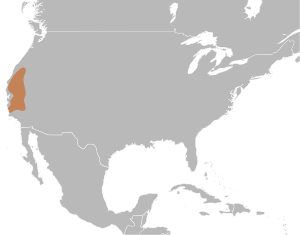California night snake facts for kids
Quick facts for kids California night snake |
|
|---|---|
| Scientific classification |
|
| Kingdom: | Animalia |
| Phylum: | Chordata |
| Class: | Reptilia |
| Order: | Squamata |
| Suborder: | Serpentes |
| Family: | Colubridae |
| Genus: | Hypsiglena |
| Species: |
H. ochrorhynchus
|
| Subspecies: |
H. o. nuchalata
|
| Trinomial name | |
| Hypsiglena ochrorhynchus nuchalata W.W. Tanner, 1943
|
|
 |
|
| California night snake range | |
| Synonyms | |
|
|
The California night snake (Hypsiglena ochrorhynchus nuchalata) is a small subspecies of colubrid snake. It lives only in California. This snake is a little bit venomous, but it is not harmful to humans.
Contents
What Does the California Night Snake Look Like?
This snake can grow to be about 12 to 26 inches (30 to 66 cm) long. That's about the length of a ruler or two! When they are born, baby snakes are around 7 inches long.
Snake Features
The California night snake has a narrow, flat head. Its dorsal scales (the scales on its back) are smooth and arranged in 19 rows. Its eyes have pupils that are shaped like a vertical oval, similar to a cat's eye.
Colors and Patterns
Their color can be light gray, light brown, tan, or cream. This often helps them blend in with the ground where they live. They have dark brown or dark gray blotches (spots) along their back and sides. The underside of their body is usually whitish or yellowish and has no marks. They also have two large dark marks on their neck and a dark stripe across or behind their eyes.
How Does the California Night Snake Behave?
As its name suggests, the California night snake is mostly nocturnal. This means it is active at night.
What Do California Night Snakes Eat?
Their main diet is lizards. They will also eat smaller snakes. Sometimes, they might eat soft-bodied insects too.
Where Do California Night Snakes Live?
These snakes prefer dry or semi-dry habitats. They like places with rocky soils.
How Do California Night Snakes Reproduce?
The California night snake is an oviparous subspecies. This means the females lay eggs. They usually breed from April to September.
Where Can You Find the California Night Snake?
The California night snake lives throughout western California. You can find them in the areas around the central valley, but not inside the valley itself. It is one of two types of night snakes found in California. The other type is the desert night snake, called Hypsiglena chlorophaea.
 | DeHart Hubbard |
 | Wilma Rudolph |
 | Jesse Owens |
 | Jackie Joyner-Kersee |
 | Major Taylor |

